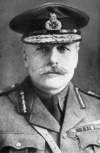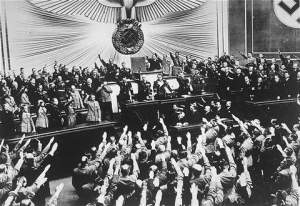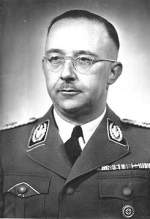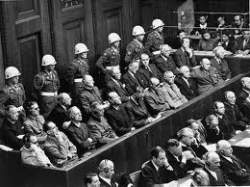
February 20

1905 February 20-March 10: Russo-Japanese War: The last major land battle of the war, the Battle of Mukden, Southern Manchuria, pits Russian forces (276,000) under General Alexei Nikolajevich Kuropatkin against Imperial Japanese Army forces (270,000) of Field-Marshal Prince Oyama Iwao over a front extending more than 90 miles. By the end of the battle, Russian casualties will total 90,000 while Japanese forces will suffer 70,000 casualties. [See: Countdown to Infamy: Timeline to Pearl Harbor.]
1917 World War I: Despatch Number 5 by Sir Douglas Haig, British Commander-in-Chief:

As pointed out in my last Despatch, the object of these operations was to gain a local success by a sudden attack at a point where the enemy did not expect it. Our repeated attacks in Flanders and those of our Allies elsewhere had brought about large concentrations of the enemy's forces on the threatened fronts, with a consequent reduction in the garrisons of certain other sectors of his line. Of these weakened sectors the Cambrai front had been selected as the most suitable for the surprise operation in contemplation. The ground there was, on the whole, favourable for the employment of tanks which were to play an important part in the enterprise, and facilities existed for the concealment of the necessary preparations for the attack.
1919 Death: Habibullah Khan: Amir of Afghanistan:
The leader of Afghanistan who struggled to keep his country neutral in World War I in the face of strong internal support for Turkey and the Central Powers, is shot and killed while on a hunting trip . . . .
Habibullah had succeeded his father, Abd-ar-Rahman, as Amir in 1901 and immediately began to bring much-needed reforms and modernization to his country, including electricity, automobiles and medicine . . . . Though the British and Russian governments signed a convention in 1907 pledging respect for the territorial integrity of Afghanistan, many Afghans‑‑including Habibullah‑‑felt insecure between such powerful neighbors and resented the lack of Afghan representation at the creation of the convention and the effective control Britain still exercised over the country's foreign affairs due to its active involvement in the region . . . .
By maintaining his country's neutrality and Afghanistan's anti-war policy, Habibullah enraged many of his young anti-British countrymen who viewed World War I as a holy war. Many Afghans felt particularly strongly that Habibullah failed to capitalize on the weakness of Russia, which was overtaken by the Bolsheviks in November 1917, by uniting the Muslim peoples of Central Asia and liberating them from non-Muslim rule.
Barely a year after Turkey's defeat at the hands of the Allies and the end of the war in November 1918, Habibullah's opponents, angry at what they saw as his betrayal of Muslim interests in favor of pandering to Britain, plotted and carried out his assassination.
1920 Nazi party: The Twenty-five Point Program of the German DAP is officially adopted within the party, though not yet announced to the public. Hitler will stand by these points throughout his political career, though some of the more socialist points will be ignored to one degree or another
1. We demand the unification of all Germans in the Greater Germany on the basis of the right of self-determination of peoples.
2. We demand equality of rights for the German people in respect to the other nations; abrogation of the peace treaties of Versailles and St. Germain.
3. We demand land and territory (colonies) for the sustenance of our people, and colonization for our surplus population.
4. Only a member of the race can be a citizen. A member of the race can only be one who is of German blood, without consideration of creed. Consequently no Jew can be a member of the race.
1933 Nazi party: Hermann Goering sponsors a fundraiser for Hitler at his residence, a small palace, in Berlin. Attending are Gustav Krupp of Krupp steelworks, Albert Voegler of United Steel, Fritz Springorum, another steel magnate, and Georg von Schnitzler of I.G. Farben, among others. One of the 25 business titans at this meeting is Eduard Schulte, chief executive officer of Giesche, "one of the oldest industrial undertakings in the world and one of the most valuable in Europe." THP) [See: Did Hitler's Leadership Save the German Economy?]
1934 Latvia: Parliament rejects proposals to abolish Jewish autonomy:
The Black Hundred [a right-wing Russian gang] set out to attack the Jews in Ludza, to beat them up and plunder their shops. It is well known that no decent Latvian belongs to the Black Hundred. It had been decided to attack the Jews.
1938 Various:
Britain: Foreign Secretary Anthony Eden resigns in protest over Prime Minister Neville Chamberlain's decision to negotiate with Italian dictator Benito Mussolini.
Adolf Hitler addresses the Reichstag:

It fills us, in the fifth year following the first great foreign political agreement of the Reich, with sincere gratification to be able to establish that, in our relationship to the State with which we had perhaps the greatest differences, not only has there been a detente, but that in the course of these years a constant improvement in relations has taken place.
I know perfectly well that this was above all attributable to the circumstance that at the time there was no Western parliamentarism in Warsaw, but a Polish field-marshal, who as an eminent personality felt the significance, so important to Europe, of such a Germano-Polish detente. This good work, which had been doubted by so many at the time, has meanwhile stood the test, and I may say that, since the League of Nations finally gave up its perpetual attempts to unsettle Danzig and appointed in the new commissioner a man of great personal attainments, this most dangerous spot from the point of view of European peace has entirely lost its menacing character. The Polish State respects the national conditions in this State, and both the city of Danzig and Germany respect Polish rights. And so the way to a friendly understanding has been successfully paved, an understanding which, starting from Danzig, has to-day succeeded in spite of the attempts of certain mischief-makers in finally taking the poison out of the relations between Germany and Poland and transforming them into a sincere, friendly co-operation. [See: Was Adolf Hitler 'Forced' Into the War?]
Church and Reich: Bishop Ehrenfried of Wuerzburg in a pastoral letter expresses the desire that "the totalitarianism of the State and the totalitarianism of the Church" should coexist "without conflicts and bitterness." (THP)
Church and Reich: Franz Josef Rarkowski is consecrated as bishop of the German army in a lavish ceremony conducted by Nuncio Orsenigo, assisted by Bishops Preysing and Galen. Rarkowski will hold this post until the end of World War II. (THP)
Military Bishop Franz Josef Rarkowski greeted the outbreak of war in Poland with a message to Catholics in uniform, calling upon them to consider "what is at stake for our Volk in these stormy days; and, in whatever is asked of you, each sees before him the shining example of a true warrior, our Fuehrer and Supreme Commander, the first and most valiant soldier of the Greater German Reich, who is even now with you at the battlefront." Some allowance might be made for a military bishop taking it as part of his professional responsibility to bolster the morale of the armed forces. Even granting that possibility, however, the rabid nationalism of all of Rarkowski's wartime pastorals went far beyond the call of duty.
1939 Death: Georgy Nikolayevich Kosenko (aka Kislov):
One thing about the first years of Soviet history that always puzzled me is how the Bolsheviks managed to create a wide and reliable network of foreign intelligence and counter-intelligence so [quickly] . . . .
Georgy Nikolayevich Kosenko was born on 12 May 1901 in Stavropol. He was a smart schoolboy. Foreign languages, especially French, were among his favorite subjects. He graduated from school when the Russian Civil War began and his parents became active Bolsheviks. Stavropol was a region of fierce struggle between the Whites and the Reds . . . . The anti-Bolshevik Volunteer Army had good support in Southern Russia, but . . . the factory workers who concentrated in the cities tended to support the Bolsheviks. Georgy's father participated in the revolt in Stavropol and in 1918 he was executed by the Whites. Georgy's sister was a Bolshevik since 1914 and actively worked for the revolutionary underground. Soon after the death of their father, she too was caught and hanged . . . .
So, choosing sides in the civil war was not difficult for young Georgy. In 1920 he became a secret agent of Cheka in Stavropol; in 1921 he joined the RCP(b) (Russian Communist Party, Bolsheviks) and became a private in the OGPU military detachment. From 1924 he was a full-fledged officer of OGPU (the new name of Cheka) . . . . In February 1937 Kosenko received a report [of a conspiracy] to organize Stalin's assassination. When Kosenko sent this information to Moscow, Stalin was infuriated and ordered Trotsky and his top aides killed. Among other operations to this end, Moscow sent Trotsky's eventual murderer Ramon Mercader from Spain to France. Kosenko had to help him to enter the circle of Trotsky's close friends. Although this intrigue turned out to be a success, it would claim Kosenko's life before Trotsky's.
In July 1938, Kosenko's Spanish opposite number and sometime collaborator Alexander Orlov fled to the USA, guaranteeing his own safety, (and that of the mother he left in the USSR) by threatening to reveal Soviet intelligence secrets if pursued. Orlov sent a letter to Trotsky warning him that a Soviet agent named Mark had penetrated his son's circle, and that the NKVD was preparing the assassination of Trotsky . . . . (Trotsky thought the tip was a provocation, and fatefully ignored it.)
Stalin went mad. He ordered the new head of NKVD Lavrentiy Beria to punish all spies involved in the debacle. Kosenko was one of them. In November 1938 Kosenko received an order to return to Moscow and on 27 December he was put to the same jail where General Miller was still imprisoned. Kosenko was accused of participation in a counter-revolutionary organization and on 20 February he was sentenced to death. That same night of 20-21 February 1939 he was shot and his body was buried in an tomb without any name or date.
So, this story does not answer the question I asked in the beginning, but rather dismisses it by proving that the Soviet intelligence network was wide but far from reliable and that eventually these spies either eagerly got rid of each other or simply fled as far as they could. (Dmitri Minaev of De Rebus Antiquis Et Novis)

1941 World War II: North Africa: British and German patrols make contact for the first time in the desert, near El Agheila: [See: The Mediterranean Strategy.]
The British seriously underestimated the Germans' ability to wage war in the desert in early 1941. As a result, only the 2nd Armored Division, 9th Australian Division, and one Indian motorized brigade were left on occupation stations. Rommel took advantage of this by striking. [For further details, Click here.]
1942 Various: World War II: Pilot O'Hare becomes first American WWII flying ace:
On this day, Lt. Edward O'Hare takes off from the aircraft carrier Lexington in a raid against the Japanese position at Rabaul-and minutes later becomes America's first flying ace.
In mid-February 1942, the Lexington sailed into the Coral Sea. Rabaul, a town at the very tip of New Britain, one of the islands that comprised the Bismarck Archipelago, had been invaded in January by the Japanese and transformed into a stronghold—in fact, one huge airbase. The Japanese were now in prime striking position for the Solomon Islands, next on the agenda for expanding their ever-growing Pacific empire. The Lexington's mission was to destabilize the Japanese position on Rabaul with a bombing raid.
Aboard the Lexington was U.S. Navy fighter pilot Lt. Edward O'Hare, attached to Fighting Squadron 3 when the United States entered the war. As the Lexington left Bougainville, the largest of the Solomon Islands in the South Pacific (and still free from Japanese control), for Rabaul, ship radar picked up Japanese bombers headed straight for the carrier. O'Hare and his team went into action, piloting F4F Wildcats. In a mere four minutes, O'Hare shot down five Japanese G4M1 Betty bombers—bringing a swift end to the Japanese attack and earning O'Hare the designation "ace" (given to any pilot who had five or more downed enemy planes to his credit).
Although the Lexington blew back the Japanese bombers, the element of surprise was gone, and the attempt to raid Rabaul was aborted for the time being. O'Hare was awarded the Medal of Honor for his bravery—and excellent aim. (History.com)
Slave Labor: Order issued by Reichsfuehrer SS Himmler to SD and SecurityPolice officers concerning Eastern Workers:

III. Combating violations against discipline.
(1) In keeping with the equal status of laborers from the original Soviet Russian territory with prisoners of war, a strict discipline must be maintained in quarters and in workshops. Violations against discipline, including refusal to work and loafing at work, will be dealt with exclusively by the secret state police. The less serious cases will be settled by the leader of the guard according to instructions from the state police headquarters with measures as provided for in the appendix. To break acute resistance, the guards shall be permitted to use also physical compulsion against the laborers. But this may be done only for a cogent reason. The laborers should always be informed that they will be treated decently when conducting themselves with discipline and accomplishing good work. In serious cases, that is, in such cases where the measures at the disposal of the leader of the guard do not suffice, the state police is to step in. In such instances, as a rule, severe measures will be taken, that is, transfer to a concentration camp or special treatment. The transfer to a concentration camp is made in the usual manner. In especially serious cases special treatment is to be recommended at the Reich Security Main Office; personal data and the exact facts must be given. Special treatment is hanging. It should not take place in the immediate vicinity of the camp. A certain number of laborersf rom the original Soviet Russian territory should attend the special treatment; at that time they are to be advised of the circumstances which lead to this special treatment. Should special treatment be required within the camp for exceptional reasons of camp discipline, this must be applied for . . . .
VI. Sexual intercourse
Sexual intercourse is forbidden to laborers of the original Soviet Russian territory. Owing to their closely confined quarters they have no opportunity for it . . . . For every case of sexual intercourse with German men or women application for special treatment is to be made for male labor from the original Soviet Russian territory, transfer to a concentration camp for female labor . . . .
VIII. Search.
Fugitive workers from the original Soviet Russian territory are to be announced on principle in the German search book. Furthermore, search measures are to be decreed locally. When caught the fugitive must in principle be proposed for special treatment.
World War II: War in the Pacific: Japanese troops land on Timor:
On the night of the 19 February, we moved out of our position. I was on a 1917 Lewis Machine gun (they had good equipment). We carried the gun, tripod, magazines, etc. When we arrived at Baboe we found the Japs had landed a lot of Paratroops. They had captured some of our men and were very cruel to them. The Japanese had dug in on Osoe Ridge and were between us and the rest.
1944 World War II: War in the Air: Big Week ends with American bomber raids on Nazi aircraft manufacturing centers.

1945 World War II: From notes of a conferences between Grand Admiral Doenitz and Hitler:
The Fuehrer is considering whether or not Germany should renounce the Geneva Convention . . . . The Fuehrer orders the Commander-in-Chief of the Navy to consider the pros and cons of this step and to state his opinion as soon as possible.
Doenitz: On the contrary, the disadvantages outweigh the advantages. Even from a general standpoint it appears to the Commander-in-Chief that this measure would bring no advantage. It would be better to carry out the measures considered necessary without warning, and at all costs to save face with the outer world. (IMT)
I myself was only told ... that the Fuehrer was upset because our Western Front was not holding, and men were quite pleased to become American and English prisoners of war. That was how the whole thing began; and that was the information which I originally received . . . . I was of the opinion that the renunciation of the Geneva Convention was in principle a great mistake and was wrong . . . .
In Hitler I saw a powerful personality who had extraordinary intelligence and energy and a practically universal knowledge, from whom power seemed to emanate and who was possessed of a remarkable power of suggestion. On the other hand, I purposely very seldom went to his headquarters, for I had the feeling that I would best preserve my power of initiative that way and, secondly, because after several days, say 2 or 3 days at his headquarters, I had the feeling that I had to disengage myself from his power of suggestion. [See: The Last Days of the Third Reich.]

1946 Nuremberg Tribunal: From the Opening Statement on Plunder of Private and Public Property by Assistant Prosecutor for the USSR, State Counsellor of Justice Second Class, L. R. Shenin:
The crimes committed by those who carried out the conspirators' criminal plans over wide areas of the Soviet land, on the fertile steppes of the Ukraine, in the fields and forests of Bielorussia, in the rich cornfields of the Kuban and the Don, in the blossoming gardens of the Crimea, in the approaches to Leningrad and in the Soviet Baltic States‑‑all these monstrous crimes, all this mass plunder and wholesale pillage of the sacred wealth created by the peaceable and honest work of the Soviet peoples, Russian, Ukrainian, Bielorussian, and others‑‑all these crimes were directly planned, designed, prepared, and organized by the criminal Hitlerite Government and the Supreme Command of Armed Forces: the major war criminals, now occupying the dock.

1947 Wunderwaffen: Fruit flies become the first living things in space as a V-2 rocket containing a jar of them (I wonder if there were air-holes punched in the bottle cap?), is launched from the White Sands Proving Ground, reaching an altitude of 60 miles. (Burrows) [See: Wunderwaffen: Hitler's Deception and the History of Rocketry.]
1976 Cold War: SEATO disbands:
After operating for 22 years, the Southeast Asia Treaty Organization concludes its final military exercise and quietly shuts down. SEATO had been one of the bulwarks of America's Cold War policies in Asia, but the Vietnam War did much to destroy its cohesiveness and question its effectiveness.
SEATO was formed in 1954 during a meeting in Manila called by U.S. Secretary of State John Foster Dulles. Eight nations-the United States, France, Great Britain, Australia, New Zealand, the Philippines, Thailand, and Pakistan-joined together in the regional defense organization to "stem the tide of communism in Asia." At the time, that "tide" was most threatening in Southeast Asia, particularly in the former-French colony of Vietnam. There, a revolution led by the communist Ho Chi Minh resulted, in 1954, in an agreement for the withdrawal of French forces, the temporary division of Vietnam (with Ho's forces in control in the north), and nationwide elections two years hence to reunify the nation and select a president. The United States, believing that Ho was merely a pawn for international communism, reacted by establishing SEATO and including "South Vietnam" (which was not technically an independent nation) under its umbrella of protection.
When the United States became fully committed to the Vietnam War in 1965, it called upon its SEATO allies for assistance. Only Australia, New Zealand, the Philippines, and Thailand responded with a few thousand troops and other aid. This made clear that the driving force behind SEATO was the United States. Despite their anticommunist rhetoric, Great Britain and France wanted no part of another Asian war and Pakistan simply wanted the military assistance that membership in SEATO granted. As the war in Vietnam became increasingly frustrating and unpopular, SEATO began to crack. By the time the conflict in Vietnam ended in 1975-with South Vietnam's fall to the communist North Vietnamese-only five nations were left to carry out the final SEATO military exercise in February 1976. A mere 188 troops from the United States, Great Britain, the Philippines, Thailand, and New Zealand showed up in the Philippines to conduct what was basically a civic action operation. Roads, schools, and a dam were built by the troops in the Philippine countryside. Afterwards, while "Auld Lang Syne" was played, closing ceremonies marked the end of SEATO. (History.com) 1986 Chunnel plans announced:
Attempts to dig a channel tunnel between Britain and France date back to 1883, and Napoleon drew blueprints for a tunnel in 1802. Yet not until February 20, 1986, were France and Britain able to announce that a tunnel would soon become a reality. Trains, cars and buses would be able to speed through the tunnel in less than half an hour. Construction began in December 1987 and the "chunnel" was finally completed in 1994. (History.com)
Edited by Levi Bookin (Copy editor) Click to join 3rdReichStudies FAIR USE NOTICE: This site may contain copyrighted material the use of which has not always been specifically authorized by the copyright owner. We are making such material available in our efforts to advance understanding of historical, political, human rights, economic, democracy, scientific, environmental, and social justice issues, etc. We believe this constitutes a 'fair use' of any such copyrighted material as provided for in section 107 of the US Copyright Law. In accordance with Title 17 U.S.C. Section 107, the material on this site is distributed without profit to those who have expressed a prior interest in receiving the included information for research and educational purposes. If you wish to use copyrighted material from this site for purposes of your own that go beyond 'fair use', you must obtain permission from the copyright owner. Please note that the list-owner and the moderator are not responsible for, and do not necessarily approve of, the random ads placed on our pages by our web server. They are, unfortunately, the price one pays for a 'free' website.
levi.bookin@gmail.com







